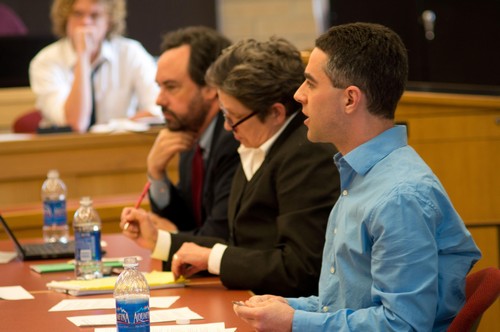 Photo by: Ryan Lumpkin
Photo by: Ryan Lumpkin
Two law professors debated last Wednesday over the constitutionality of Obamacare, which has been challenged by several states and is now pending before the U.S. Supreme Court.
Adjunct DU law professor David Kopel and associate law professor Scott Moss of the Univerisity of Colorado (CU) faced off on the constitutional legitimacy of the Affordable Care Act (ACA) at Sturm College of Law. Kopel argued against the constitutionality act. Moss argued for it.
“For the Supreme Court to uphold Obamacare would be to invert what the people adopted and what the Supreme Court has held about the meaning of interstate commerce power and the necessary and proper clause from the founding to the present,” said Kopel in the debate.
Over 100 people attended the debate, which was moderated by DU professor of civil procedure and torts (civil wrongs) Ann Scales.
“A direct tax, a tax on simply existing, must be apportioned by state population,” said Kopel in regards to the ACA’s power to mandate interstate commerce.
The Supreme Court arguments over the constitutionality of the ACA, which included issues of interstate commerce, where people are forced to buy things nationally instead of purchasing them from the state, were held for three dayss.
The arguments finished on March 28.
A decision is not expected until the end of June.
DU Law American Civil Liberties Union (ACLU) sponsored the debate.
Other sponsors included ACLU of Colorado, the DU Law Constitutional Rights and Remedies Program, the DU Law Health Law Society, the DU Law Chapter of the College Republican and the DU Law Democrats.
President-elect and first-year representative of DU Law ACLU Marissa Malouff, a first-year law student, picked the ACA as the debate topic because of its prevalence. “We thought a lot of people were really interested, especially during the oral argument,” said Malouff. “It seemed like an opportunity to get students engaged.”
Kopel, who argued against the constitutionality of ACA in the debate, is an adjunct professor of Advanced Constitutional Law. He has filed two amicus briefs, which are documents submitted by someone not related to the case, on the ACA to the Circuit Court of Appeals. Moss, who argued for the act, is an associate professor of law at CU Boulder who specializes in federal litigation of public law claims.
Issues discussed in the debate included the power of Congress to compel someone to engage in commerce, or buy healthcare whether or not the ACA is a tax and how strictly the Constitution should be read.
“Healthcare can either become the type of society that lets the guy die, or we can accept that in this kind of society,” said Moss. “We need to solve the problem of people dropping out and cost-shifting.”
Kopel said rather there is no accession to wealth in people’s refusal to buy Congressionallymandated health insurance.
“When you sit on your couch, watching NCAA basketball and not buying health insurance, you are no wealthier than before,” said Kopel, who has been a part of the ACLU since 1978.
Kopel and Moss were each given five minutes for an opening statement before Scales began asking questions, such as what the other side’s best argument was, or whether or not “Obamacare” was a poor substitute for single-payer insurance.
“I think that a reading of the Constitution that says if Congress wants to reform the seriously messed up health market that we now have, it must jump straight to single-payer,” said Moss when asked about single-payer insurance. “Frankly, what used to be the Republican idea that Romney and Gingrich argued for back in the day of simply mandating purchases is a reading of the Constitution that does exactly what Chief Justice Marshall said not to do, which is putting the government in a straight jacket of being unable to do what it needs to do.”
After following the national and school debates, law students are interested in seeing which direction the ruling goes.
“This is really a historic argument that we’re having both at the Supreme Court level and law schools nationally,” said Lee Knox, a third-year law student and treasurer of DU’s chapter of the ACLU. “It’s a historic decision that will affect us for 50 or 100 years based on how the court rules.”
Malouff said the ACA, which she cites as Obama’s key legislative achievement, has the potential to be overturned, but is currently, “up in the air.”











